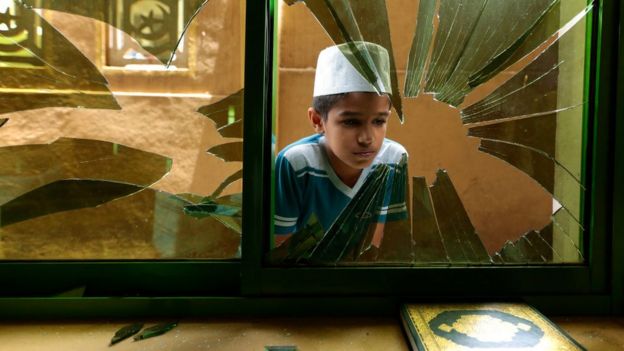Sri Lanka attacks: What led to carnage?
Sri Lanka is in a state of shock and confusion, trying to understand how a little-known Islamist group may have unleashed the wave of co-ordinated suicide bombings that resulted in the Easter Sunday carnage - the worst since the end of the civil war a decade ago.
The South Asian island nation has experience of such attacks - suicide bombers were used by Tamil Tiger rebels during the civil war. But the ruthlessness of the new atrocities has stunned the nation anew. Eventually the government spokesman, Health Minister Rajitha Senaratne, came out and blamed National Thowheed Jamath (NTJ), a home-grown Islamist group, for the bombings.
"There was an international network without which these attacks could not have succeeded," he told reporters on Monday.
That might go some way to explaining how a group that has been blamed for promoting hate speech may now have been able to scale up its capacity so monumentally.
The IS claim should be treated cautiously. It is not clear whether these men were trained by the group or simply inspired by IS ideology.
Political deadlock and confusion
The manner in which NTJ was identified was circuitous. The prime minister said there had been warnings made to officials that hadn't been shared with the cabinet. He said only the president would get such briefings, even though it is not clear if he personally did in this instance.This is not an insignificant statement from a prime minister who was at loggerheads with the president for much of the past year. Many are drawing a conclusion about how political discord can have serious consequences - as well as undermining trust in the messages being put out.
If the suicide bombers were local Sri Lankan Muslims, as stated by the government, then it is a colossal failure by the intelligence agencies. Information is also now emerging in the US media that the Sri Lankan government may also have had warnings from US and Indian intelligence about a possible threat.
"Our understanding is that [the warning] was correctly circulated among security and police," Shiral Lakthilaka, a senior adviser to President Maithripala Sirisena, said.
The Sri Lankan president, who oversees security forces, has now set up a committee to find out what went wrong.
Sri Lankan intelligence was credited with foiling several suicide attacks by the Tamil Tiger rebels at the height of the civil war and for penetrating a well-knit and ruthless Tamil Tiger organisation.While this is clearly a security and political failure, there are also questions about the nature of communal strife in Sri Lanka's more recent history. During the civil war, Muslims were also targeted by Tamil Tiger rebels and suffered at their hands.
But Muslim community leaders say successive Sri Lankan governments have failed to restore confidence among young Muslims following more recent attacks by some members of the majority Sinhalese Buddhist community.
One of the worst incidents was in the town of Digana in central Sri Lanka where one person died when a Sinhalese mob attacked Muslim shops and mosques in March last year.
 Image copyright Getty Images
Image copyright Getty Images The attacks and what the youths perceived as the lack of action by the government may have led some of them towards groups like NTJ.
Some of the radicals were blamed for damaging Buddhist statues in recent years and their leader was arrested last year for offending religious sentiments. He later apologised for offending the sentiments of the Buddhist Sinhalese.
Comments
Post a Comment